Meowing and purring are the main forms of vocalization in cats. While most cat owners don’t mind if their pet purrs a lot, it’s different when a cat meows excessively.
As well as the worry that there could be something wrong with the cat, many people find the noise itself to be irritating and annoying.
Quick Overview: Excessive Meowing In Cats





Why Is My Cat Excessively Meowing?
Cats meow as a way to communicate a wide variety of messages, ranging from hunger to a need for attention to illness and more.
Simply put, cats meow to communicate. The following causes are the most common reasons.
- Hunger. If a cat is hungry, the easiest way for them to let you know is to meow excessively.
- Thirst. If your cat meows at you, check that their water bowl is not empty.
- Attention seeking. If your cat wants your attention for any reason at all, then a meow is the best way to make you notice them. for example, If your cat won’t stop meowing at night and they’re standing by the door or at the window, they might want to go outside.
- Stress. If there is anything causing your cat to feel stressed, they may meow more often and more loudly e.g. social changes (such as a new home, a new cat or different people visiting the house), activity outside the house that they can see, loud noises such as fireworks, travel in the car, etc.
- Illness. Some serious health issues (e.g. kidney disease, or urinary tract diseases such as cystitis or bladder obstruction) can cause cats to meow more often. Other longer-term conditions like hyperthyroidism (an overactive thyroid gland) or high blood pressure, may cause cats to be more vocal.
- Pain. Cats in distress may vocalize by meowing (e.g. a cat that is in pain due to urinary obstruction may meow loudly while sitting on the litter box).
- Cognitive dysfunction. Senior cats often suffer from a form of dementia, which can lead to more vocalization.
- Anxiety. Your cat might meow a lot if they’re feeling anxious or afraid. You might also notice them peeing or pooping outside the litter tray, and they might develop stress-related health problems like cystitis or overgrooming
- Social interactions. Female cats meow loudly when in heat, and males do the same when they pick up the scent of a female in heat. Cats also meow and yowl loudly at each other if they have hostile encounters with other cats, especially if there is a territorial dispute.
- Deafness. If cats cannot hear their own voice, they may meow more loudly and more often.
- Breed. Some cat breeds (e.g. Siamese) have a louder, more frequent, and more persistent meow than other breeds.
- Catnip. Many cats react strongly to catnip, and the altered cat behavior can include meowing and yowling.
- No apparent reason. Cats sometimes just meow, with no obvious cause.
How to Stop Excessive Meowing
To stop excessive meowing, you first have to identify the underlying cause, then resolve it.
Your Cat Won’t Stop Meowing? First, try to identify why your cat is vocalizing more often, then attempt to address this underlying cause.
- Hunger. Check if your cat’s food bowl is empty, and if needed, top it up. If your cat starts to meow every time they are hungry before mealtime, if you feed them in response, you are likely to accidentally teach them to do this more often. The use of an automatic feeder that opens at specific times could be one way of stopping this from happening.
- Thirst. A water bowl or an automatic fountain, topped up routinely every day, can ensure that your cat never goes thirsty.
- Attention seeking. You should try to give your cat attention (e.g. playtime) at random times when they are not looking for attention so that they do not learn that they need to meow to get your attention.
- Stress. Behavior problems are probably the most common cause of excessive meowing in cats. Look for ways to remove stress from your cat’s life (e.g. for indoor cats especially, make your home more cat-friendly, with cat furniture like cat trees). Introduce new pets carefully (e.g. using scent swapping) to minimize stress. Other possible behavior modifications include new cat toys, more time spent playing with your cat, and changes in your home layout, such as obstructing visual access to the outdoors with screens so that cats outside can no longer be seen. Learn to understand your cat’s tail body language so that you can spot it more easily if they are feeling stressed.
- Illness and pain. Have regular checkups with your local DVM veterinarian to ensure that your cat stays in good health. The frequency of visits depends on your cat’s age: adult cats need a check-up once a year or any time they seem unwell, while senior cats should have twice-yearly checkups.
- Cognitive dysfunction. Older cats should be regularly assessed by your veterinarian to check for the common diseases of old age, including cognitive dysfunction.
- Social interactions. It makes sense to spay female cats and castrate male cats. This will reduce vocalization linked to sexual behaviors.
Cats usually meow for a good reason, so if your cat starts to meow excessively or annoyingly, you should analyse their home situations to try to work out the cause.
This will allow you to remove the underlying reason for the meow, which should in turn encourage them to be quieter.
Frequently Asked Questions
Why is my cat meowing non stop?
There are many possible causes of continuous meowing: this is never normal. Check the list of possible reasons above, and if you are not sure why this is happening, it's safest to have your cat checked by your local veterinarian.
Why is my cat meowing excessively?
Excessive vocalization can be a sign of underlying illness, and it's important to find out why they are doing this. Read through the list of possible causes above, and try to work out which applies. If you are not sure, then consult with your local veterinarian.
What to do with a cat that won't stop meowing?
If you cannot work out why your cat is continually meowing, you should consult your local veterinarian: your cat is trying to tell you something, and they should not be ignored.
How do you get a cat to shut up?
The only way to get a cat to meow less often and less loudly is to identify why they are doing this, so that you can address the cause. The best way is to view this as a puzzle or mystery to be solved: if you can find the answer, your home life will be calmer and more peaceful.
Why is my cat meowing so much?
Cats usually meow for a particular reason, so if your cat starts to meow excessively, you should start by analyzing their home situations to try to work out the potential cause.
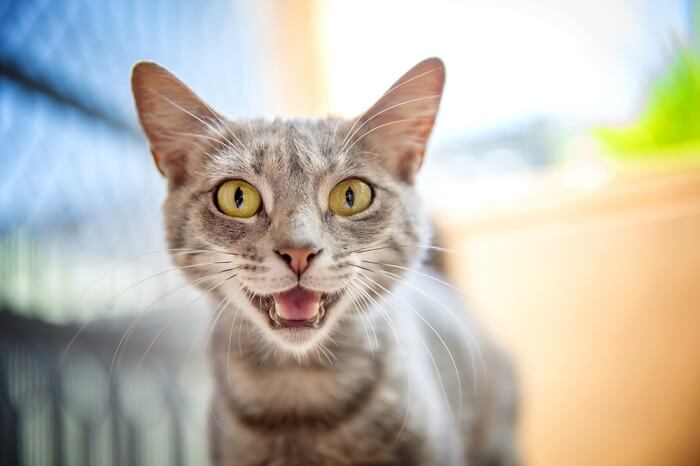
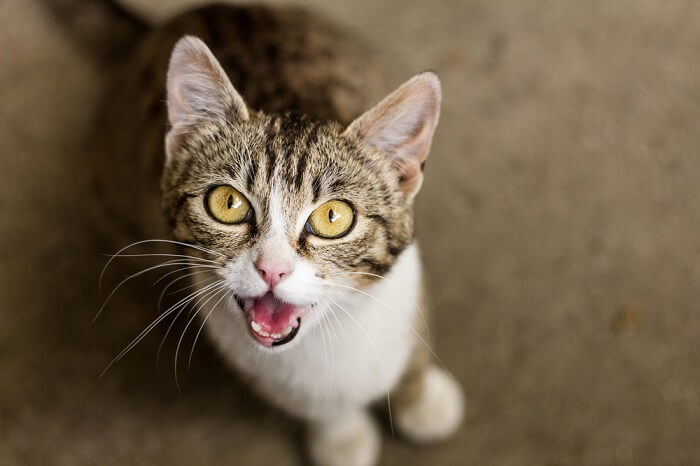
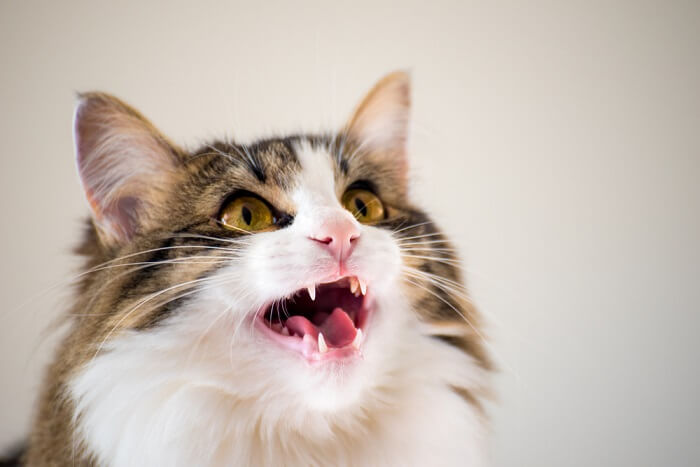

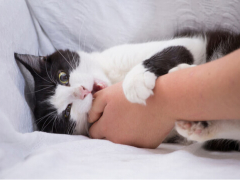
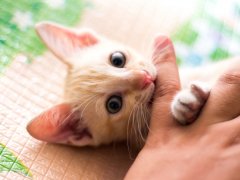

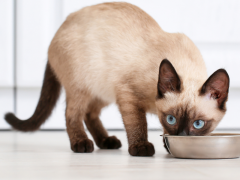



Why is my 5 month fixed male kitten so aggressive to my 4 fixed year old female cat? How to stop.
This is a complex one Denise – cats can be very territorial, even when fixed. It’s normal, natural behaviour for some cats to be aggressive to other cats that they see as being in their territory. You should try to give them both enough space in your home – one litter box per cat plus one extra (that’s three litter boxes), enough vertical and horizontal space (cat trees, cat gyms), that sort of thing. You might find it helpful to read this article: https://cats.com/aggression-in-cats
Very informative site!! Great information.
My 12 year old tabby cat and I have many great conversations, especially when he is not getting enough attention from me. We talk quite a bit, so I’m glad it’s not abnormal!
We have a visiting cat who is pregnant. She like to sleep at ours in the daytime. constant meowing this morning – could be she is going into labour ! We know where she lives should we get her home asap.
thank you.
Hi Jan, it sounds like it might be a good idea to talk to the cat’s owner. If the cat is going into labor, she should be kept inside in a safe environment.